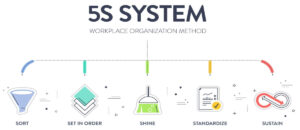Written By – PKC Desk, Edited By – Vigneshwaran, Reviewed By – Balaji Prasath
Organizations are continually looking for methods to improve efficiency and maximize customer value in the shifting landscape of business operations. Understanding and maximizing the ratio of value-added to non-value-added activities in corporate processes is a crucial component of this objective. We’ll discuss the importance of these initiatives in the context of process improvement in this blog, as well as how businesses may strategically manage their operations to achieve the best outcomes.
Defining Process Improvement, Value added, and Non Value added activities
Process Improvement
The continuous effort to improve and streamline corporate processes inside an organization is referred to as process improvement. The objective is to improve the effectiveness, efficiency, and responsiveness of processes to the demands of the company and its clients. To improve workflows and produce better outcomes, process improvement involves evaluating current procedures, locating areas for improvement, and putting new ideas into practice.
Value Added Activities
Activities that add value constitute the core of any business process. hese are the tasks that directly lead to the development of a good or service that meets the client’s needs. Value-added operations improve the consumer experience from product design and manufacturing to providing customized services. For businesses to remain competitive and satisfy customers, it is essential to identify and maximize these activities.
Examples include Product Design and Development, Quality Control, etc.
Non-Value Added Activities
Conversely, non-value-added operations are those that don’t directly improve the final good or service. These actions could involve pointless paperwork, repeated approvals, or ineffective lines of communication. To streamline procedures and cut operating expenses, it is essential to identify and minimize non-value-added operations.
Examples include Excessive Paperwork, Excessive Inspections, unused Features in Products, etc.
The Mix of Value added and Non-Value added activities in a business process
Understanding the relationship between these two types of activities is essential for effective process improvement, as the essence of process improvement lies in striking the delicate balance between these two categories of activities. While the goal is often to minimize non-value-added activities, it is equally crucial to recognize their importance in the broader organizational context.
While non-value-added activities are frequently targeted for elimination or reduction in process improvement efforts, it is critical to recognize that they can still play an important role in certain corporate business processes. Here are some of the reasons why non-value-added activities may be important in the workplace:
Regulatory Compliance:
Non-value-added activities may be required in some industries to meet regulatory requirements. Although not directly contributing to product/service value, documentation, reporting, and certain administrative tasks are necessary for legal compliance and keeping business operations within the bounds of the law.
Corporate Governance and Ethics
Activities related to corporate governance, ethical practices, and compliance with codes of conduct may not be directly tied to product or service creation but are essential for maintaining a positive corporate image and fostering trust among stakeholders.
Employee Training and Development
Non-value-added activities related to employee training and development, while not directly linked to immediate production or service delivery, are crucial for building a skilled and adaptable workforce. Investing in employees’ skills can contribute to long-term efficiency and innovation.
Environmental and Social Responsibility
Non-value-added activities that focus on sustainability, environmental responsibility, and corporate social responsibility may not contribute directly to the product’s value but are becoming increasingly important in the corporate world. These activities can enhance the company’s reputation and align it with evolving societal expectations.
The following strategies may be used for process improvement
Lean Thinking
Lean principles are implemented by systematically identifying and eliminating waste from processes. Organizations can streamline workflows, reduce lead times, and improve overall efficiency by distinguishing between value-added and non-value-added activities.
Six Sigma Methodology
Six Sigma emphasizes data-driven decision-making to improve process quality and efficiency. Through rigorous analysis, organizations can pinpoint areas with excessive non-value-added activities and implement targeted improvements to enhance performance.
Value Stream Mapping
Visualizing the entire process through value stream mapping allows organizations to identify bottlenecks and areas of inefficiency. This approach helps in prioritizing improvement efforts and aligning resources with value-added activities.
Continuous Improvement Culture
Cultivating a mindset of continuous improvement encourages employees to identify and address non-value-added activities proactively. Regular feedback loops and open communication channels play a vital role in sustaining a culture of ongoing enhancement.
Recognizing the role of value-added and non-value-added activities in process optimization is a strategic requirement. Organizations that achieve this balance position themselves for long-term success by providing higher value to customers while improving operational efficiency. Adopting a culture of continuous improvement becomes the driving force for remaining ahead in a competitive marketplace as firms grow.
Author

Ramseshan Renganathan
A passionate problem solver driven by excellence, I use innovative ideas to deliver impactful solutions and drive positive change.

 Expert verified
Expert verified 
